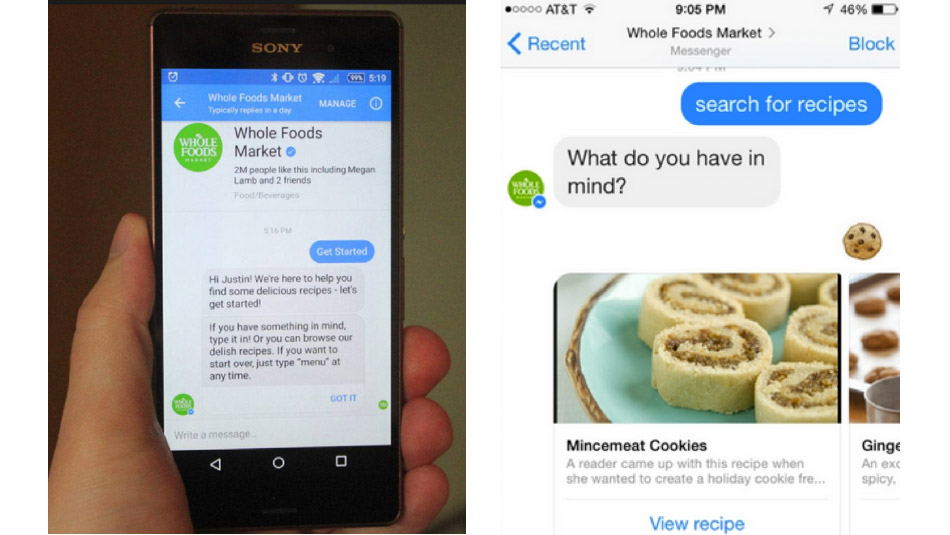
New Ways Food Marketers are Using Artificial Intelligence
Historically, food marketers are not considered early adopters of new technologies. But this is all changing in some very new and profound ways. Artificial Intelligence (AI) is one area where food marketers are making use of the latest and greatest technical advances. And with this new technology able to deliver bottom-line results, food marketers are quickly advancing its application.
Spurred by the influx of affordable, advanced data analytics tools, the AI revolution in food marketing has progressively grown as marketers prove the power of data-driven decision-making. While this is not a new phenomenon, we are at a point where almost everyone is exploring new ways AI can and will evolve how they go-to-market. And change is happening fast. AI has become remarkably more sophisticated in the past year alone. What AI is now doing for personalization and customer engagement, as well as how it helps provide exceptional in-store experiences is game changing.
The food industry is a complicated web of endless combinations spanning spices, flavors, products, and ingredients. Understanding exactly what each customer wants is a big challenge. Here are a few ways AI is helping food marketers unveil the mystery of consumer preferences to provide a more sophisticated, personalized approach.
AI-Powered Personalization Increases Sales
AI has been a hot topic for food retailers for years, and for good reason. This new technology has the power to track customer insights in real-time and speed up decision-making. It has genuinely reshaped how grocers’ approach countless scenarios from personalized promotions to pricing optimization, assortment challenges, and much more.
The ability to self-learn is especially interesting for food marketers. It allows them to optimize processes in real-time throughout a campaign. Take for instance Knorr, a food and beverage brand from Unilever. Its AI-powered social tool, Eat Your Feed, scans a user’s Instagram post and generates recipe suggestions based on their personal preferences. Using insights learned, the brand launched its Love at First Taste campaign targeting millennials. Based on the idea that people are attracted to others with the same food taste, followers answer a few questions to uncover their personalized flavor profiles. With the goal of making the 145-year-old brand relevant to millennials, users then share their flavor profiles in hopes of finding others who share their same taste.
 Since 79% of consumers say they’ll engage with a brand’s marketing if it’s been tailored for them, this is a big deal. According to Evergate, 88% of U.S. marketers are reporting measurable improvements through personalization. More than half of those polled reported a lift greater than 10%. So harnessing the power of AI to suggest personalized recipes directly impacts business goals.
Since 79% of consumers say they’ll engage with a brand’s marketing if it’s been tailored for them, this is a big deal. According to Evergate, 88% of U.S. marketers are reporting measurable improvements through personalization. More than half of those polled reported a lift greater than 10%. So harnessing the power of AI to suggest personalized recipes directly impacts business goals.
Chatbots are Speeding Up the Way We Engage
AI-powered applications (apps) are quickly becoming commonplace within the food industry. AI-powered chatbot apps are elevating grocery retailer’s marketing efforts.
Prior to AI being integrated into this technology, chatbots altered the entire customer service experience. Now, AI-powered chatbots are taking these benefits to a whole new level. At a basic level, chatbots enable food brands to provide quicker and more cost-effective service to their customers. One example is how Whole Foods is using their own customer AI chatbot.
 The Whole Foods AI-powered chatbot lets customers browse to find products they’re interested in. Then an integrated Facebook Messenger chatbot helps them find recipes specific to that product. Users can also select an emoji, like a jalapeno or a banana, and then receive recipe recommendations using those products. But it’s more than a chat with an AI agent who knows how to cook! With an ability to mix-and-match words, emojis, select cuisines, and understand keywords (such as keto, gluten-free) this app is a breeze for customers regardless of their personal preferences. It’s helping to quickly transition Whole Foods’ customers through the purchasing journey so a purchase (or multiple) becomes inevitable.
The Whole Foods AI-powered chatbot lets customers browse to find products they’re interested in. Then an integrated Facebook Messenger chatbot helps them find recipes specific to that product. Users can also select an emoji, like a jalapeno or a banana, and then receive recipe recommendations using those products. But it’s more than a chat with an AI agent who knows how to cook! With an ability to mix-and-match words, emojis, select cuisines, and understand keywords (such as keto, gluten-free) this app is a breeze for customers regardless of their personal preferences. It’s helping to quickly transition Whole Foods’ customers through the purchasing journey so a purchase (or multiple) becomes inevitable.
Smart Apps are Making Mega Data Useful
Collecting large volumes of data from sensors and other sources, Smart Apps function with the help of machine learning algorithms and predictive analytics. However, AI is supercharging these apps with an ability to produce real-time, actionable information for marketers. And we’re seeing food marketer’s using these apps in some very novel ways.
New AI-powered smart apps are learning the food habits of users then generating recipes and suggestions based on this information. Users interact directly with the app and tell it what they have eaten. The app then calculates calories and other nutritional information and makes personalized recommendations. Consequently, smart apps have become fundamental to delivering on the promise of user-relevant, timely, and practical information to drive brand value.
The Future of Food Advertising is Already Here
We may have had our first glimpse of what AI-powered food advertising will look like in the future with Burger King’s newest campaign. Using a deep learning algorithm, the progressive QSR giant has created a whole new approach to advertising.
With its introduction they also announced an an innovative business model called Project: AOR. They claim they’re moving from the traditional Agency of Record model to an Agency of Robots. Wow!
Burger King AOR – Math Chicken Tender +++ from Jean Zamprogno on Vimeo.
The campaign is built upon the analysis of thousands of fast-food commercials and competitive reports from industry research. The AI algorithm uses pattern recognition to identify insight into more effective, strategic communication. Based upon this data, it informs which of these patterns are more successful towards any given goal. In this case, purchase intent.
Using this system, hundreds of unique commercials were created and tested with various focus groups. They are the first ads created entirely by AI and now are airing nationally.
This is the promise of AI. It allows food marketers to dig deeper than individual product sales to determine the full bottom-line impact of promotions and inventory choices. Machine learning excels in finding patterns and correlations within data. That’s exactly the kind of capability the food marketer of tomorrow needs.
If you haven’t yet taken the opportunity to explore the full potential of AI in your food marketing programs, jump in now. It’s a great time to get your feet wet and begin accumulating experience with this rapidly emerging and powerful tool.





